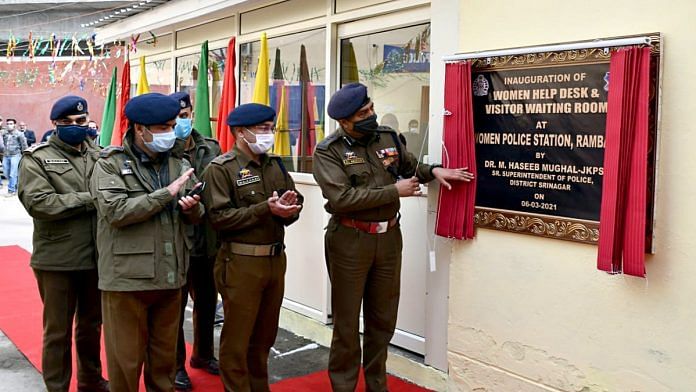New Delhi: Officers posted in police stations with dedicated women’s help desks (WHDs) are more likely to register cases of violence against women, especially in resource-constrained and patriarchal environments, a study that entailed the largest known randomised controlled trial of police reform in India has found.
The study — conducted by researchers from the University of Virginia in the US and the University of Oxford in the UK — argues that it’s not enough to simply add female officers to the police force, and that gender sensitisation of male and female officers is vital to addressing gender-based violence. The findings were published Thursday in the peer-reviewed academic journal Science.
Focussing on 180 police stations in Madhya Pradesh, the researchers conducted a massive randomised controlled trial of reform measures. The team chose the state as it’s similar, in terms of socio-economic indicators and gender norms, to much of northern India.
The ability to report crimes to law enforcement is a crucial step in addressing gender-based violence, but a lack of trust in police and stigma surrounding violence against women can result in under-reporting, the study says.
Along with this, police unresponsiveness creates a large gap between the incidence of crime and the rates at which such crimes are formally addressed, it adds.
During the trial, the researchers evaluated the impact of WHDs, whose personnel are trained to be gender-sensitive and have an enlisted panel of lawyers, psychologists and NGOs to facilitate legal aid, counselling, shelter, rehabilitation, and training.
Also Read: Complaints filed against Canada-based director as poster shows woman dressed as Kaali smoking
Advantage of women’s help desks reflected in filing of FIRs, DIRs
While gender-targeted police reforms are often proposed to help curb gender-based violence, evidence of their efficacy remains mixed, says the study.
The researchers collected data from five sources. These included administrative data on crimes registered between May 2018 and March 2020 at police stations assessed for the study, CCTV data from the entrances to these police stations, a user survey of people who visited them, surveys of personnel there, and a survey of citizens about safety, opinions of and contact with the police.
The researchers compared data from police stations with no WHDs, those with WHDs run entirely by women, and those run by male and female officers.
The findings suggest that even in resource-constrained and patriarchal environments, efforts that focus attention on women’s cases can make police officers more responsive to women’s security concerns. This, the study says, is reflected in the higher registration of both First Information Reports (FIRs) and Domestic Incident Reports (DIRs) between 2018 and 2020.
Domestic violence can be registered in a DIR, a complaint mechanism created under the Protection of Women from Domestic Violence Act, 2005. Filing a DIR initiates civil proceedings and referrals to social services, allows for protection orders and economic support, and may also lead to criminal proceedings. Unlike FIRs, which are registered at police stations, the DIR is filed with the local magistrate.
Through WHD training, officers gained knowledge of the DIR and learned to coordinate with other state and civil society agencies, the study says.
The researchers find that the presence of additional female officers is critical for overcoming barriers to FIR registration. This gender-differentiated effect exists for FIRs, but not DIRs, the authors write.
This, they suggest, may be happening because unlike a DIR, an FIR automatically initiates a criminal case, requiring investment of police time for investigation and in court proceedings.
‘WHDs help ascribe value to work on women’s cases’
Women police officers appear to have been particularly responsive to WHD training, the study found.
“…WHDs helped to give visibility and ascribe value to work on women’s cases, rather than casting such work as peripheral to and therefore of lesser importance than other crime prevention tasks,” the authors write. “Our findings suggest that descriptive representation does matter; female officers played a critical role in shaping the impact of the help desks.”
The study also highlights the limitations of police-centered reforms.
First, despite training, gender attitudes among the police are difficult to change, but female officers were more receptive.
Second, barriers to women reporting such crimes remain, as the citizen survey showed that only 10 per cent of women were aware of WHDs.
The study also says that WHD intervention did little to address deep-seated social and economic structures that drive violence against women and inhibit their access to justice. Efforts to address gender-based violence require multi-pronged approaches that extend beyond police reforms, the researchers conclude.
(Edited by Gitanjali Das)
Also Read: ‘Hijab row BJP bid to humiliate women’ — IS threatens violence to protect ‘honour of our sisters’



